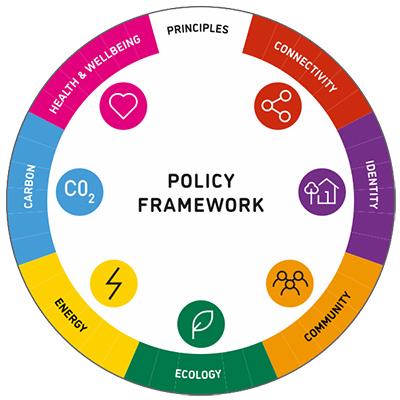Introduction

Christ Church has developed and implemented a Responsible Ownership Policy for Property (ROPP). As long-term investors we have a particular interest in addressing our environmental and social responsibilities.
We recognise that property investment, management and development can have a very obvious and long-lasting impact on local communities, including our own in Oxford and surrounding areas. We are also conscious of the risks of climate change and the choices we can make to ensure that we positively impact the environment and help work towards achieving the United Kingdom’s carbon objectives.
ROPP guides responsible decision-making according to 7 Principles:
Connectivity, Identity, Community, Ecology, Energy, Carbon, Health and Wellbeing
ROPP has been endorsed by our Investment Group and our Finance Committee, taking into account its practical and financial implications and ensuring that we have an approach which we can implement efficiently, and has been ratified by our Governing Body. Consideration has been given to both governance and process, read more here.
Principles
Guided by sustainable property development experts at Igloo Regeneration, our property consultants at Savills, and our own team of in-house professionals and academics, we have co-created a set of seven Principles by which we would guide, and ultimately judge, our responsible approach to property investment, management and development. Within each principle there are environmental and social considerations:
ENVIRONMENTAL
Components that require research into a variety of elements that illustrate a development project's impact on the earth.
SOCIAL
Elements like organisational culture & relationships that impact employees, stakeholders, partners, communities, customers, consumers & suppliers.
-
CONNECTIVITY

ENVIRONMENT
A place that’s connected to its surrounds by design, permeable, open and inviting.
SOCIAL
People-focussed design – encouraging healthy, active lifestyles and supporting local amenities, business and employment.
United Nations Sustainable Development Goals (SDGs)
-
IDENTITY

ENVIRONMENT
A contextual but bespoke approach to design and place making.
SOCIAL
Being ‘of’ the place and local community, engaging communities and stakeholders in the visioning and decision process to help shape it.
United Nations Sustainable Development Goals (SDGs)
-
COMMUNITY

ENVIRONMENT
An approach to environment and place that puts people at its heart.
SOCIAL
A caring and connected community, for all – building social capital.
United Nations Sustainable Development Goals (SDGs)
-
ECOLOGY

ENVIRONMENT
A connected, sustainable, bio-diverse, natural place.
SOCIAL
Connecting people with nature.
United Nations Sustainable Development Goals (SDGs)
-
ENERGY

ENVIRONMENT
Responsible resource and energy usage, sustainably sourced.
SOCIAL
Optimised, clean, affordable energy for all.
United Nations Sustainable Development Goals (SDGs)
-
CARBON

ENVIRONMENT
A zero carbon development – in design, delivery, use and future use.
SOCIAL
Supporting a local, green economy (see ‘donut economics’) in development; encouraging responsible behaviours in use.
United Nations Sustainable Development Goals (SDGs)
-
HEALTH & WELLBEING

ENVIRONMENT
Salubrious places and spaces.
SOCIAL
Connecting people and catering and caring for all life styles, needs and stages.
United Nations Sustainable Development Goals (SDGs)

